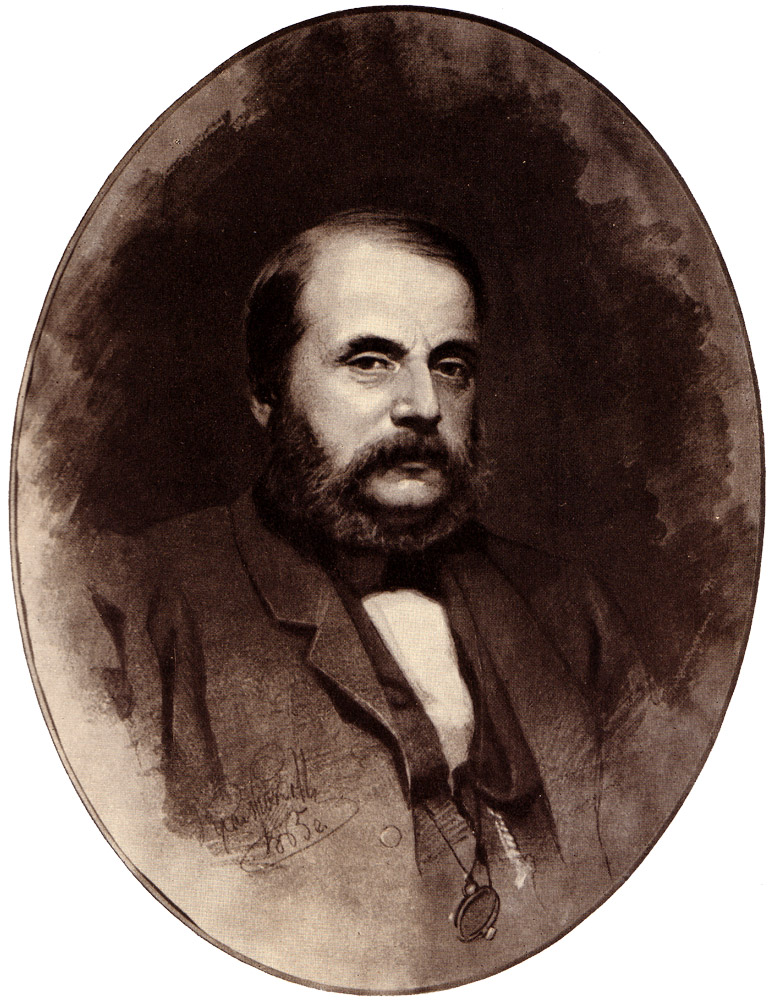- Ivan Goncharov
Infobox Writer
name = Ivan Aleksandrovich Goncharov

imagesize = 200px
caption = Portrait ofIvan Goncharov byIvan Kramskoi
birthdate = Birth date|1812|06|18.
birthplace =Simbirsk ,Russia
deathdate = Death date and age|1891|09|27|1812|06|18
deathplace =Saint Petersburg ,Russia
period = 1847–1871
nationality = Russian
notableworks = "Oblomov " (1859)
portaldisp = nIvan Aleksandrovich Goncharov ( _ru. Ива́н Алекса́ндрович Гончаро́в) (OldStyleDate|18 June|1812|6 June–OldStyleDate|27 September|1891|15 September) was a
Russia n novelist best known as the author of "Oblomov " (1859). He was born in Simbirsk (nowUlyanovsk ); his father was a wealthy grain merchant. After graduating fromMoscow University in 1834 Goncharov served for thirty years as a minor government official.In 1847, Goncharov's first novel, "Obyknovennaia istoriia" (usually translated into English as "A Common Story" [Towards the end of his life he wrote some memoirs entitled "An Uncommon Story", in which he accused his literary rivals, above all Turgenev, of having plagiarized his works and prevented him from achieving European fame. This document, the product of an unstable and unhappy mind, was not published until 1924.
D. S. Mirsky , "A History of Russian Literature" (New York: Vintage, 1958)] ), was published; it dealt with the conflicts between the excessive Romanticism of a young Russian nobleman, freshly arrived in Saint Petersburg from the provinces, and the emerging commercial class of the Imperial capital with its sober pragmatism. It was followed by "Ivan Savvich Podzhabrin" (1848), a naturalist psychological sketch. Between 1852 and 1855 Goncharov voyaged toEngland ,Africa ,Japan , and back to Russia viaSiberia as the secretary of AdmiralYevfimy Putyatin . His travelogue, a chronicle of the trip, "The Frigate Pallada" ("The Frigate Pallas"), was published in 1858 ("Pallada" is the Russian spelling of "Pallas "). His wildly successful novel "Oblomov " was published the following year and the main character was compared to Shakespeare'sHamlet who answers "No!" to the question "To be or not to be?".Fyodor Dostoyevsky , among others [For exampleAnton Chekhov is quoted as stating that Goncharov was "...ten heads above me in talent." (see Gayla Diment's Introduction to Stephen Pearl's translation of "Oblomov " (New York: Bunim & Brown, 2006)] , considered Goncharov a noteworthy author of high stature. Turgenev, who fell out with Goncharov after the latter accused him of plagiarism (specifically of having used some of the characters and situations from "The Precipice", whose plan Goncharov had disclosed to him in 1855, in "Home of the Gentry " and "On the Eve "), nevertheless declared: "As long as there is even just one Russian alive,Oblomov will be remembered!" ["Пока останется хоть один русский, - до тех пор будут помнить Обломова!". Quoted in N. F. Budanova, "Ispoved' Goncharova - Neobyknovennaia istoriia", "Literaturnoe nasledstvo", 102 (2000): 202.]In 1867, Goncharov retired from his post as a government censor and then published his last novel - "Obryv" (in English "The Precipice") (1869), which is the story of a romantic rivalry among three men and provides a condemnation of nihilism in defence of the religious and moral values of old Russia. Goncharov also wrote short stories, critiques, articles (including a famous essay in 1871 on Griboyedov's "
Woe from Wit "), and some memoirs that were only published posthumously in 1919. He spent the rest of his days absorbed in lonely and bitter recriminations because of the negative criticism some of his work received, which was at least partly well deserved. Goncharov never married. He died in St. Petersburg.External links
*Gutenberg author|id=Ivan_Goncharov|name=Ivan Goncharov
* [http://www.kirjasto.sci.fi/ivangont.htm Short biography and discussion of his works]References
Wikimedia Foundation. 2010.
